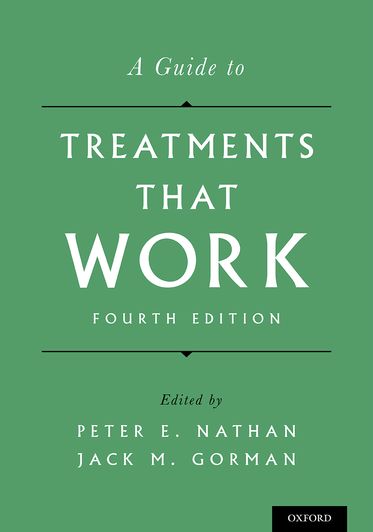A Guide to Treatments That Work

A Guide to Treatments That Work
|
ISBN: |
9780199342211 |
|
Binding: |
Hardback |
|
Published: |
15 Jul 2015 |
|
Availability: |
|
|
Series: |
$460.00 AUD
$526.99 NZD
Add To CartDescription
Each chapter in A Guide to Treatments That Work follows the same general outline: a review of diagnostic cues to the disorder, a discussion of changes in the nomenclatures from DSM-IV to DSM-5, and then a systematic review of research, most of which has been reported within the last few years, that represents the evidence base for the treatments reviewed. In all, 26 of the volume's 28 chapters review the evidence base for 17 major syndromes. Featuring this coverage is a Summary of Treatments that Work, an extended matrix offering a ready reference by syndrome of the conclusions reached by the chapter authors on treatments that work reviewed in their chapters. New to this edition are two chapters at the beginning of the book. Chapter 1 details two perplexing issues raised by critics of DSM-5: the unrealized potential of neuroscience biomarkers to yield more accurate and reliable diagnoses and the lingering problem of conflicts of interest in pharmaceutical research. Chapter 2 contrasts Native American and western ways of identifying effective treatments for mental and physical disorders, concluding that "evidence-informed culture-based" interventions sometimes constitute best practices in Native communities. Two chapters detailing pharmacological treatments for pediatric bipolar disorder (Chapter 9) and pediatric depressive disorder (Chapter 12) have also been added. More than three quarters of the chapters are written by colleagues who also contributed to most or all of the previous editions. Hence, this new edition provides up-to-date information on the quality of research on treatment efficacy and effectiveness provided by individuals who know the research best.
Contents
Authors
Edited by Peter E. Nathan , Professor, Department of Psychology, University of Iowa
Edited by Jack M. Gorman , CEO and Chief Scientific Officer, Franklin Behavioral Health Consultants
Peter E. Nathan, PhD, received his PhD in Clinical Psychology from Washington University in 1962. After spending two years as a research fellow, he then joined the Harvard psychiatry service at Boston City Hospital. In 1969, he became a Professor of Psychology and Director of Clinical Training at Rutgers University, later serving as Henry and Anna Starr Professor and Director of the Rutgers Center of Alcohol Studies. In 1990 he accepted the position of Provost and Distinguished Professor of Psychology at the University of Iowa and became Emeritus in 2007. Jack M. Gorman, MD, received his medical degree from the College of Physicians and Surgeons of Columbia University in 1977 and did residency and fellowship training in the Columbia University Department of Psychiatry/New York Psychiatric Insitute program. He remained on the fac ulty of Columbia University's Department of Psychiatry for the next 25 years, eventually serving as Lieber Professor of Psychiatry. He then became the Esther and Joseph Klingenstein Professor and Chair of Psychiatry and Professor of Neuroscience at the Mount Sinai School of Medicine. He is currently CEO and Chief Scientific Officer, Franklin Behavioral Health Consultants.
Reviews
"This book belongs in every college library. It is a systematic review of various treatments currently in use for thoroughly all of the recognized mental disorders. Written by experts in the field and complete with many useful bibliographies, the volume is of considerable importance to those interested in the field of mental health and treatment... Highly recommended." --Choice
"A Guide to Treatments That Work is a mammoth effort... This book began as a project of an APA Division 12 task force which made the significant decision to broaden its scope to include efficacious treatments whether psychosocial or medical in type. Psychologist Peter Nathan, chair of the task force, is joined as coeditor by Jack Gorman, a prominent biological psychiatrist, and the chapters are written by highly respected clinical researchers from both camps... This book is a boon in that regard." --Contemporary Psychology
"This is one of the best, most comprehensive discussions of psychiatric disorders and treatments that I have ever encountered... simply wonderful." --Journal of Neurology
"In this book, you will find detailed research--and experience-based information on pharmacological and psychological treatments that work on a long list of disorders relating to human thought and action... This is an excellent text for all people working in mental health." --BizIndia
"This book's main strength is that the authors are using an evidence-based approach to psychotherapy for many major psychiatric conditions, an area many clinicians unfortunately neglect in their treatment recommendations. This is a worthy effort and one book likely to be used over and over, not accumulating dust on a shelf." --Doody's